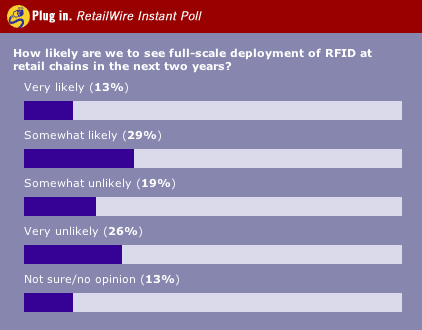By
George Anderson, Editor-in-Chief, RetailWire
The
Metro Group is taking its radio frequency
identification (RFID) program past the test
stage to full deployment at 200 locations.
The company has made its seriousness known
by mandating its top 650 suppliers be ready
with a tag program by early next year.
Jonathan
Collins, senior analyst with ABI Research,
told RFID Update, that Metro is serious
about compliance with its program.
"Metro
is going to pass through the additional
handling cost of an untagged pallet. Mandate
compliance will be built in to the contractual
relationship between Metro and each supplier,"
he said.
"This
is a somewhat stronger step than we've seen
from other high-profile deployments like
Wal-Mart," Mr. Collins told RFID
Update. "It is absolutely a statement
of intention, and a serious one at that."
According
to the analyst, Metro's move to full-scale
RFID deployment will motivate others in
Europe to follow suit.
"The
Metro deployment is a good signal that a
lot of the hurdles can be managed and that
UHF RFID can be done. The reasons for thinking
RFID is a better investment are becoming
clear," he said.
"I
think it's fair to say that in the first
half of next year you will see other European
companies making similar announcements.
Maybe they won't have the same teeth as
the Metro announcement, but they will certainly
entail rolling out RFID in the supply chain."
Discussion Question
for the BrainTrust panel:
What will U.S. retailers take from the Metro
RFID rollout? Will we see a full-scale deployment
of RFID at Wal-Mart, Best Buy or other retail
chain currently testing the technology in
backrooms or other applications?
RetailWire
Instant Poll Results:

RetailWire BrainTrust Comments:
Retailing
economics in Germany and the U.S. have some
significant differences, which might lead
to substantially different RFID return on
investment. German labor, transportation,
warehousing, and real estate costs are much
higher than the U.S., and gross profit margins
are often higher, too. Since the cost of
any new technology is highest at first,
the first successful adopters should be
the businesses with the greatest opportunity.
- Mark
Lilien, Consultant, Retail Technology Group
RFID activity
will increase tremendously in the pharma
industry to meet the pedigree requirements
of every state. As applications are invented
and delivered to accommodate those requirements,
more and more applications will be perfected.
As applications and products are perfected,
the cost will go down and adoption will
become more cost efficient. Adoption for
the electronics market for higher end merchandise,
like that sold in Best Buy, is a no brainer.
It is the CPG market that struggles for
the ROI.
- Susan
Rider, President, Rider and Associates,
LLC
|
Retail Management Consultants President
& CEO, George Whalin, Says
: |
 In
a world where suppliers of all kinds
and sizes provide retailers with merchandise,
mandating compliance is not only foolish,
but totally impractical. In
a world where suppliers of all kinds
and sizes provide retailers with merchandise,
mandating compliance is not only foolish,
but totally impractical.
What do you
say? Send
us your comments here |
It seems
that Wal-Mart also told suppliers they had
to be fully RFID compliant by a certain
date. As we know, that didn't happen. It's
easy to mandate such things but, in a world
where suppliers of all kinds and sizes provide
retailers with merchandise, mandating compliance
is not only foolish, but totally impractical.
I suppose we'll see if Metro can make it
happen with their suppliers.
- George
Whalin, President & CEO, Retail Management
Consultants
High-end
and consumer electronics retailers like
Best Buy and Coach are now acting on RFID
faster than those in the discount and food
channels because there are loss prevention
and warranty elements that are being combined
with the tracking component of RFID. The
drug and DIY channels will have to take
the issue category by category, which should
yield some great implementation lessons.
Interestingly,
insurance, particularly car insurance, and
health care are seeing plenty of advances
around RFID. I don't see any US retailer
moving to full deployment before the end
of the decade, my forecast at the start
of the RFID phenomenon, but Best Buy and
a few others may be there shortly into the
next decade.
- Ron
Margulis, Managing Director, RAM Communications
It’s
easy for us all to say something will happen
but if you've ever worked within a retailer's
walls, you realize how much change management
a move like this will require. It simply
must be proven out and prioritized to happen...and
most retailers will wait for others to work
out the bugs first.
-
Laura
Davis-Taylor, Founder and Principal, Retail
Media Consulting
Read
the entire story and RetailWire discussion
at:
http://www.retailwire.com/Discussions/Sngl_Discussion.cfm/12401
Get
Plugged in with RetailWire.
Membership
in RetailWire.com
is free to all retail and related industry
professionals. Simply go to www.retailwire.com
and click the FREE REGISTRATION button.
|